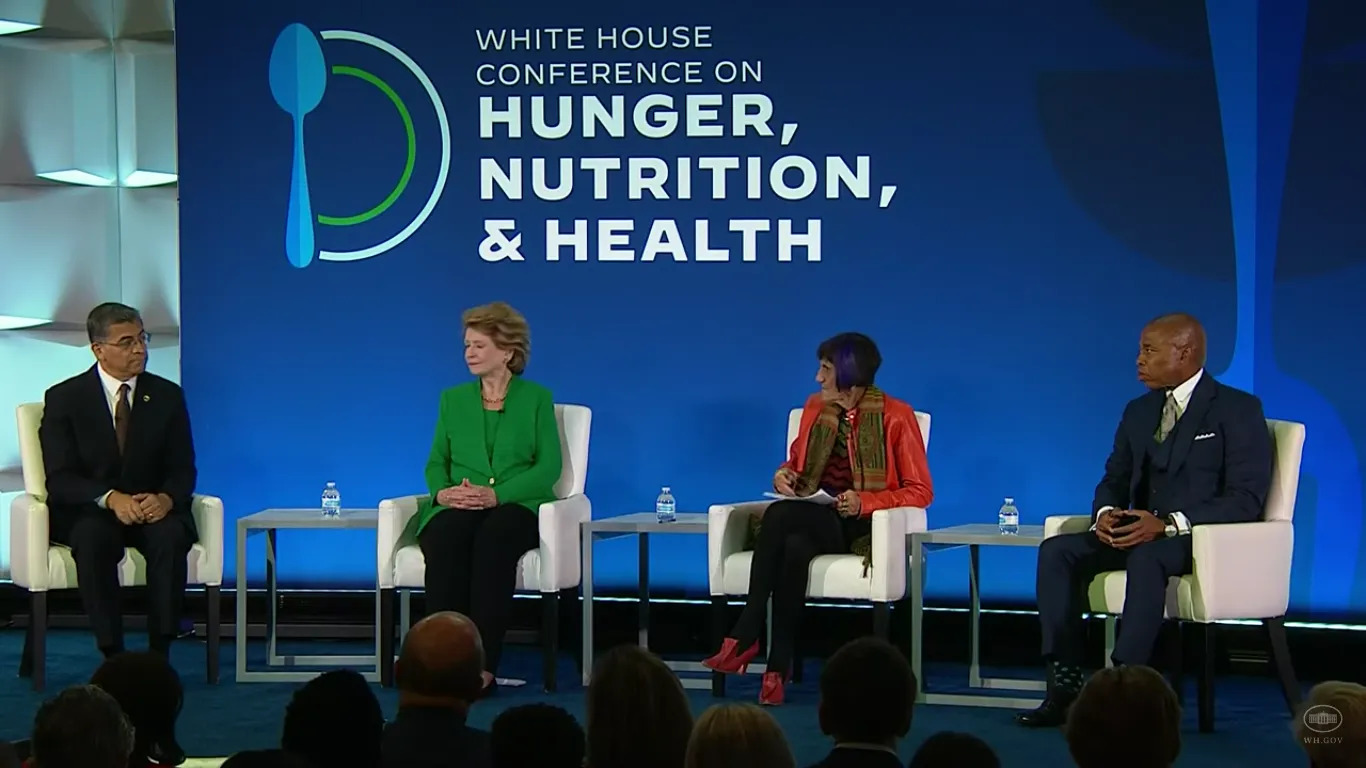Huge news coming out of the nation’s capital last week, though most of the praise goes farther north, to the Big Apple. On Wednesday, the Biden-Harris Administration hosted the White House Conference on Hunger, Nutrition, and Health, modeled after a 1969 summit on the same topics which spawned some of the country’s most famous food policies, including school breakfast, dietary guidelines, and the WIC program. New York City mayor Eric Adams was a featured panelist, and used the opportunity to announce a revolutionary plant-based initiative — one that was quietly rolled out six months ago and has been chugging right along without a hitch. New York City is serving plant-based meals by default at all eleven of the city’s hospitals!
Hospitals using plant-based foods to advance public health is exciting on its own merit, but the fact that the city used a plants-by-default approach is truly unique. A growing body of research confirms that behavioral nudges, including defaults, are the most effective strategy to change diets. Now the US’ largest city is wielding that strategy to improve the health of its citizens.

Secretary Xavier Becerra, Sen. Debbie Stabenow (D-MI), Rep. Rosa DeLauro (D-CT), and Mayor Eric Adams
Beginning in March of this year, NYC Health + Hospital’s 11 campuses began offering plant-based “Chef’s Specials” for lunch — entrees inspired by Latin and Asian cuisines that represent the hospital system’s diverse patient population. Each day, patients are first offered two plant-based Chef’s Specials. If they want neither of the specials, they are then offered a wider array of choices that includes both meat and vegetarian options. The approach harnesses the power of defaults to nudge patients toward healthy, sustainable eating; patients have to opt out of the default and opt into omnivorous options, which means that only those willing to perform additional steps eat animal products.
How successful has the initiative been? Put simply, the Chef’s Specials are both widely eaten and widely enjoyed. Only 1% of patients identify as vegetarian or vegan, but over 50% of eligible patients are choosing one of the plant-based meals. (Due to certain medical conditions, not all patients are eligible to receive plant-based meals.) What’s more, approximately 95% of patients who choose one of the Chef’s Specials are satisfied with their meal, a testament to plant-based foods’ culinary potential in the hands of knowledgeable cooks. Healthy food — even hospital food — can be delicious.

Popular dishes include sancocho (a Caribbean stew known for its tubers and roots) and arroz con gandules y calabaza (rice with pigeon peas and squash). The hospitals’ team of chefs and nutritionists set out to devise a menu of familiar, comforting dishes made with affordable, accessible ingredients so that patients could take what they’ve learned about nutrition while in hospital and apply it at home once discharged. As they transform their own diets and share newfound vegetable-rich meals with loved ones, the hospitals’ influence can then begin to trickle out into the community and shape food norms across the city.
Plant-based-by-default dinners will be dished out at three hospitals in early October, with plans to expand to all 11 by year’s end. Bear in mind that NYC Health + Hospitals is the United States’ largest municipal health system, which means the impact is accordingly huge: 150,000 plant-based meals have been served already. Over the course of one year, the initiative is expected to impact well over 600,000 meals!
Wednesday’s announcement simply adds to the already robust plant-based momentum within New York City. In 2019, the city pledged to reduce beef purchases by 50 percent by the year 2040. More recently, city administrators teamed up with the Coalition for Healthy School Food to successfully implement “plant-powered Fridays’’ in NYC public schools, showcasing a different veggie-centered entree every Friday.

Other cities coast-to-coast have passed similar meat reduction policies and school lunch programs, but it is clear now that New York City is leading the charge on not just plant-based food, but in flipping the default. Administrators are making policies not just about food but about food norms. In rolling out plant-based defaults, the city has demonstrated a commitment to both people and planet, modeling what a healthy and inclusive food system can look like.
And in choosing to invest in public health, the city is actually saving money! Sodexo, the hospital system’s food service provider, anticipates that serving plant-based meals by default will save them $1 million a year when implemented at all 11 hospitals. That only takes into account the cost of food procurement. The value of healthy citizens and a cooler planet? Priceless.
Join us in congratulating New York City on its visionary approach to public health! If you’d like to help get your city on board with plant-based defaults, join our DefaultVeg Cities email list.
Latest News
See All NewsWebinar: Food Systems Education
The Better Food Foundation is hosting a webinar, ‘Food Systems Education: Equipping the next generation of leaders through service learning” with Plant Futures & Switch4Good on Thursday, April 3, 2025 at 11:00 am PT / 2:00 pm ET.
Webinar: Best Practices in Plant-Based City Food Policy
The Center for Biological Diversity is hosting a webinar, ‘Best Practices in Plant-Based City Food Policy’ on Wednesday, April 9, 2025 at 4:00 pm ET / 1:00 pm PT.
These 7 Colleges Are Making Plant-Based Dining the New Norm This Fall
As the leaves change this fall, so do menus at universities nationwide — with plant-based foods rising to the top.